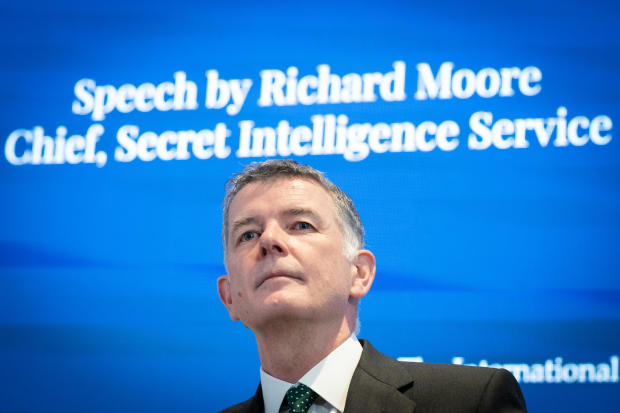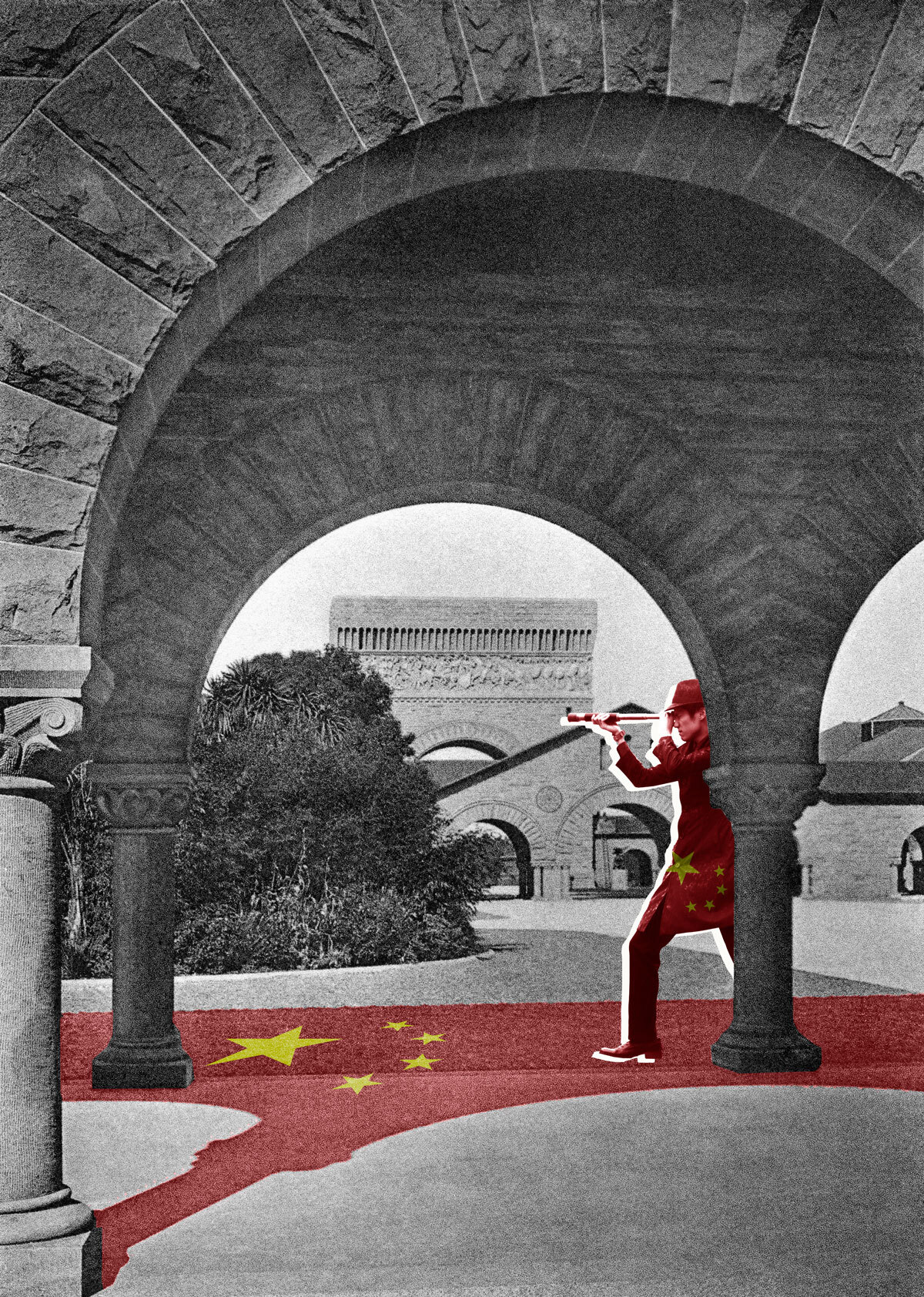British spy chief on why China is the "single greatest priority" for MI6, and what's needed to respond
London — The head of Britain's MI6 spy agency, akin to the CIA in the U.S., said in his first public speech and live interview this week that China was the "single greatest priority" for U.K. intelligence services. Richard Moore listed Russia, Iran, and foreign terrorism as other top security concerns.
Moore is the only publicly identified member of MI6. He said he was issuing a rare public briefing on the secretive spy agency's priorities because, given rapidly developing technology around the world, "to stay secret, we are going to have to become more open."
He said the intelligence agency would need to shift from keeping everything in-house, to working with private technology companies if it was to compete with the rapid advances of other nations.
"We are living through an era of dramatic change in the security landscape," Moore said. "We face adversaries who are feeling emboldened, encounter fewer constraints and are able to draw on greater resources than in the past."
China
Moore told CBS News' partner network BBC News that while it was important to work with China to tackle pressing global issues like climate change and trade, "it's also the case that China is controlled by an authoritarian regime. They don't share our values and often their interests clash with ours."
In a speech delivered to a security research group, he said "the tectonic plates are shifting as China's power, and its willingness to assert it, grows."
China is rapidly expanding its technical capabilities, including in artificial intelligence, Moore said. If the U.K. wants to keep up, it needs to be able to compete and defend itself in digital spaces.
"The huge volumes of data now available across the globe, combined with ever increasing computer power and advances in data science, will mean the integration of artificial intelligence, AI, into almost every aspect of our daily lives. Others would speak to you about the benefits associated with these new discoveries, and they are myriad. But I am paid to look at the threat side of the ledger."
For example, China's surveillance state is targeting the minority ethnic Uighur population in the Xinxang region and has detained nearly 1 million people there, carrying out wide scale human rights violations in a repressive crackdown.
"Worryingly, these technologies of control and surveillance are increasingly being exported to other governments by China, expanding the web of authoritarian control around the planet," he said.
In addition to "data traps," China has also been increasing its international influence by setting "debt traps," Moore said. In the last 10 years, China has become the largest non-commercial lender in the world, with its state-owned banks extending more credit to developing nations than the World Bank and the International Monetary Fund, according to Bloomberg.
"If you take on loans and then you find it difficult to repay them, then, you know, we've seen some examples of this where the Chinese have then been able to acquire significant ports… which have the potential to become naval facilities," Moore told the BBC.
"We want other countries to be cleareyed about the debt traps, data exposure and vulnerability to political coercion that arise from dependency on relationships where there is no recourse to an independent judiciary or free press," he said in his speech.
Moore also said that Beijing's increasing interest in exerting dominion over democratically governed Taiwan — by force if necessary — was a threat to global security.
"Beijing believes its own propaganda about Western frailties and underestimates Washington's resolve," he said. "The risk of Chinese miscalculation through overconfidence is real."
Russia
Moore said that Russia continues to pose an "acute threat" to the U.K., launching cyber attacks, interfering in the democratic process in other countries, and attempting state-sponsored killings, like the 2018 poisoning of Sergei Skripal in England. He said Britain and its allies must stand up to Russia to deter such activity.
"No country in Europe or beyond should be seduced into thinking that unbalanced concessions to Russia bring better behavior," Moore said, noting Russia's 2014 annexation of Crimea and its current troop buildup along the border with Ukraine, which the U.S. and NATO are treating as a threat.
Iran
"Iranian leadership has embraced an explicit doctrine of conflict with both Israel and the West," Moore said. "Indeed, we deeply regret that a country with an almost unparalleled depth of history and culture, such as Iran, has been the source of instability across the region and beyond for over 40 years."
In addition to interference by backing extremist groups in countries like Syria, Iran's nuclear program is also a focus for MI6, Moore said. International negotiations on its program resumed this week in Vienna.
"There are many parallels with the challenge that Russia poses, and it is no coincidence that the two countries have made common cause in Syria," Moor said. "We will continue to work to contain the threat posed by Iran, to the U.K. directly and to our allies in the region. That includes contesting Iran's development of nuclear technology, which has no conceivable civilian use."
Terrorism
The threat of terrorism has also changed as the world becomes more digital, with many terrorists and terrorist networks operating online.
"There is no longer such a thing as an analog intelligence operation in this digital world. Our intelligence targets have online lives. Our officers need to operate invisibly to our adversaries, and we need to be able to run our agent and technical operations in an environment in which 'made in China' surveillance technology is found around the world," Moore said.
He said that it would become easier for those looking to carry out an attack to conceal their plans, and that sadly, some lone wolf attacks may well get through.
The British spy chief also said the Taliban's victory in Afghanistan would mean an increased risk of international terrorist attacks.
"There is no doubt about the morale boost the Taliban victory in Afghanistan has given to the extremist movement globally, as well as its potential emboldening effect on countries such as Russia, China and Iran," he said. "I won't soft-soap it: The threat we face will likely grow. Now we have left Afghanistan, al Qaeda and Daesh [ISIS] will seek to increase their foothold and to rebuild their ability to strike Western targets."
Moore said that to counter all these threats, MI6 would have to open itself up to working with tech experts in a way it has never done before.
"We can't match the scale and resources of the global tech industry, so we shouldn't try," he said. "We are opening up our mission problems to those with talent in organizations that wouldn't normally work with national security. Unlike 'Q' in the Bond movies, we cannot do it all in-house."




